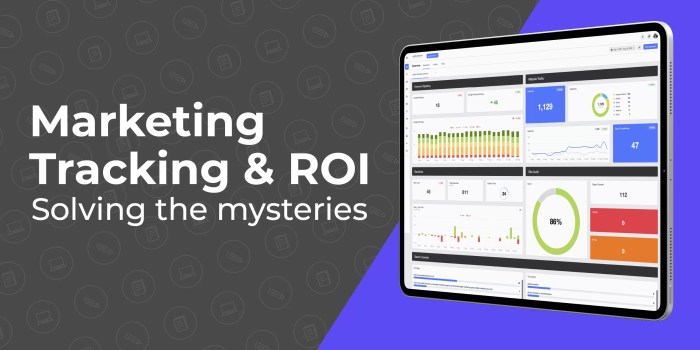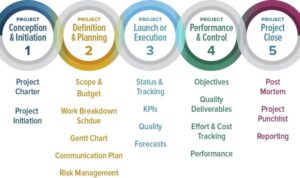With Using Data to Track Marketing ROI at the forefront, this paragraph opens a window to an amazing start and intrigue, inviting readers to embark on a storytelling journey filled with unexpected twists and insights.
Tracking marketing ROI is like following the money trail in a digital world, where every click, view, and engagement holds the key to unlocking business success. By harnessing the power of data, businesses can make informed decisions, optimize their strategies, and ultimately drive growth and profitability.
Importance of Tracking Marketing ROI: Using Data To Track Marketing ROI
Tracking marketing ROI is crucial for businesses to understand the effectiveness of their marketing strategies and campaigns. By analyzing data related to ROI, companies can make informed decisions, optimize their marketing efforts, and allocate resources more efficiently.
Measuring Effectiveness with Data
Using data to track marketing ROI allows businesses to measure the success of their campaigns in real-time. For example, companies can track website traffic, conversion rates, customer engagement, and sales data to determine which marketing channels are driving the most revenue. This information helps businesses identify areas for improvement and make adjustments to their strategies for better results.
Benefits of Using Data to Track Marketing ROI
– Data-driven decisions: By analyzing ROI data, businesses can make informed decisions based on actual performance metrics rather than assumptions or gut feelings.
– Resource optimization: Tracking ROI helps companies allocate their marketing budget more effectively by investing in strategies that provide the highest return on investment.
– Continuous improvement: Data tracking allows for ongoing optimization of marketing campaigns, leading to better results over time and increased revenue.
– Performance evaluation: By monitoring ROI, businesses can evaluate the success of their marketing efforts and make adjustments to improve future campaigns.
Types of Data Used in Tracking Marketing ROI

Tracking marketing ROI involves utilizing various types of data to measure the effectiveness of marketing campaigns and strategies. Both qualitative and quantitative data play a crucial role in this process, providing insights into the performance and impact of marketing efforts.
Qualitative Data
Qualitative data includes customer feedback, surveys, focus groups, and social media sentiment analysis. This type of data offers valuable insights into customer preferences, perceptions, and attitudes towards a brand or product. By analyzing qualitative data, marketers can understand the emotional connection between consumers and their marketing campaigns.
Quantitative Data
Quantitative data, on the other hand, consists of numerical information such as sales figures, website traffic, conversion rates, and cost per acquisition. This data helps marketers measure the tangible outcomes of their marketing activities and calculate the return on investment. Quantitative data provides concrete metrics that can be used to evaluate the success of marketing campaigns objectively.
Integration of Data Sources
To get a comprehensive view of marketing ROI, data from various sources like CRM systems, social media platforms, and website analytics need to be integrated. By combining data from different sources, marketers can gain a holistic understanding of the customer journey, from initial engagement to conversion. This integrated approach allows for a more accurate analysis of the impact of marketing efforts across different channels and touchpoints.
Tools and Technologies for Tracking Marketing ROI

Tracking marketing ROI requires the use of various tools and technologies to gather, analyze, and interpret data effectively. Let’s explore some popular options available in the market.
Customer Relationship Management (CRM) Software
CRM software like Salesforce, HubSpot, and Zoho CRM are widely used for tracking marketing ROI. These tools help businesses manage customer interactions, track leads, and monitor sales pipelines. By integrating CRM software with marketing analytics tools, companies can gain valuable insights into their marketing performance and ROI.
Marketing Automation Platforms
Platforms such as Marketo, Pardot, and Mailchimp offer automation tools that streamline the process of tracking and analyzing marketing ROI. These tools enable businesses to automate repetitive tasks, such as email campaigns, lead nurturing, and social media posting. By automating these processes, marketers can focus on analyzing data and optimizing their strategies for better ROI.
Analytics Tools
Google Analytics, Adobe Analytics, and Mixpanel are some of the popular analytics tools used for tracking marketing ROI. These tools provide in-depth insights into website traffic, user behavior, and conversion rates. By analyzing data from these tools, marketers can make informed decisions about their marketing campaigns and allocate resources more effectively.
Business Intelligence (BI) Platforms
BI platforms like Tableau, Power BI, and QlikView help businesses visualize and analyze data from multiple sources to track marketing ROI. These tools allow marketers to create interactive dashboards, reports, and data visualizations that provide a comprehensive view of their marketing performance. By leveraging BI platforms, businesses can identify trends, patterns, and opportunities to improve their ROI.
Best Practices for Utilizing Data to Track Marketing ROI
In order to effectively track marketing ROI using data, it is important to follow some best practices that can help businesses make informed decisions and optimize their marketing strategies.
Setting up Key Performance Indicators (KPIs) for Measuring Marketing ROI
Setting up key performance indicators (KPIs) is crucial for measuring marketing ROI accurately. KPIs help businesses define and track specific metrics that align with their marketing goals and objectives. Some tips for setting up KPIs include:
- Identifying clear and measurable goals for each marketing campaign or initiative.
- Choosing KPIs that directly tie back to the overall business objectives.
- Regularly reviewing and adjusting KPIs based on the performance data.
The Importance of Data Quality and Accuracy in Tracking Marketing ROI, Using Data to Track Marketing ROI
Data quality and accuracy are essential when tracking marketing ROI to ensure that decisions are based on reliable information. Poor data quality can lead to inaccurate results and misguided strategies. To maintain data quality and accuracy:
- Use reliable data sources and regularly verify the accuracy of the data.
- Implement data validation processes to ensure data integrity.
- Regularly clean and update the data to prevent errors and inconsistencies.
Successful Strategies Leveraging Data to Improve Marketing ROI
Successful businesses leverage data effectively to improve their marketing ROI. By analyzing data insights, businesses can optimize their marketing strategies and campaigns for better results. Some examples of successful strategies include:
- Implementing personalized marketing campaigns based on customer data and behavior.
- Utilizing A/B testing to compare the effectiveness of different marketing approaches.
- Using data analytics tools to track and measure the impact of marketing efforts in real-time.





